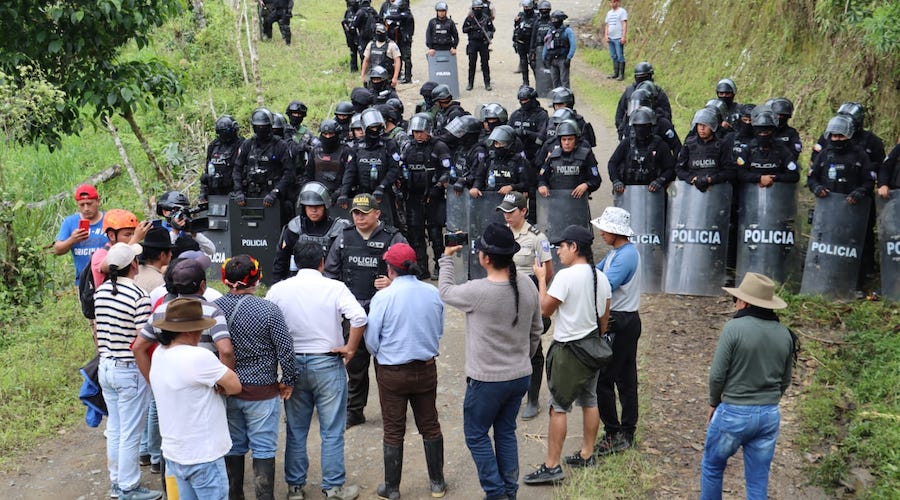Ecuadorian human rights organization denounces criminalization of anti-mining protest

Ecuador’s Ecumenical Human Rights Commission (CEDHU) issued statements this week denouncing the criminalization of anti-mining protests by law enforcement agents.
One of the statements blasted a recent decision by the Criminal Court of the Andean Bolívar province, which sentenced six environmental activists to three years in prison and to pay a fine of $4,600 for illicit association against the Curipamba – El Domo mining project.
The copper-gold project, located in the Las Naves canton, is being developed by Curimining S.A., a joint venture between Canada’s Adventus Mining (TSX-V: ADZN) and Salazar Resources (TSX-V: SRL). The miner obtained an environmental permit from the Ministry of Environment, Water and Ecological Transition of Ecuador back in January, after 27 months of paperwork and consultations.
Since Curimining was behind the complaint against the six activists, CEDHU’s communiqué criticized what it called the “abusive use of criminal law” to punish the actions of Indigenous and farming groups pushing to protect communities’ water resources, nature and human rights.
“This has become a systematic modus operandi of the Ecuadorian State which, instead of creating a protection system that guarantees the legitimate right to defend human rights, enables and even promotes this type of abusive practices that hinder the actions of community leaders, Montubias and farmers,” the brief states.
In a different communiqué that echoes a series of complaints posted over social media by the Confederation of Indigenous Nationalities of Ecuador (Conaie), CEDHU criticized that 70 people from the rural communities of Las Pampas and Palo Quemado, in the central Cotopaxi province, were charged with terrorism for protesting against an environmental consultation related to Canadian miner Atico Mining’s (TSX-V: ATY) La Plata project.
According to the Ecumenical Human Rights Commission, the problem started on March 10, when shock groups arrived in the Palo Quemando and Las Pampas communities to intimidate farming families and quash any opposition to the mining project.
The charges against the locals were laid after a series of confrontations between the two sides and the police, which took place in the context of the consultation related to La Plata and promoted by the Daniel Noboa government and the National Confederation of Farming Councils of Ecuador.
“Calling it ‘terrorism’ is a strategy used by pro-mining groups, people and companies to criminalize social organizations and defenders who do not want mining projects in their territories,” the NGO’s release reads. “This strategy has disastrous consequences on the life projects of entire families because it exposes farmers, who are not criminals and seek a dignified future for their families, to a complex and distant judicial system and a prison system plagued with corruption and violence.”
CEDHU recalled that the Constitutional Court declared unconstitutional a similar consultation advanced by the Ministry of Environment in November 2023 with the backing of a decree issued by former President Guillermo Lasso.
Both Cuniming and Atico were contacted for comment but did not respond by publication time.
{{ commodity.name }}
{{ post.title }}
{{ post.date }}




Comments